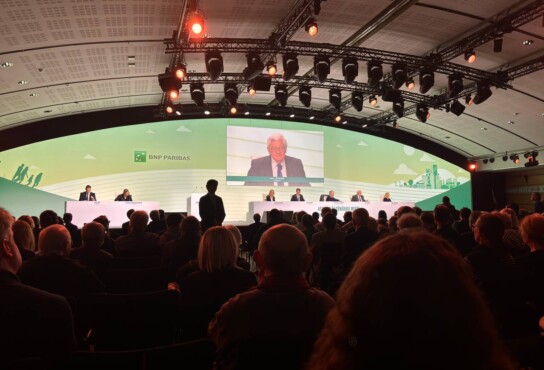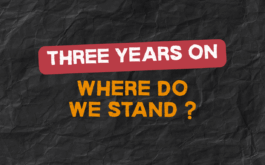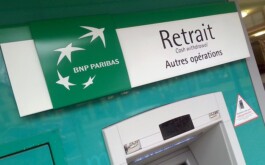
15/05/2024
The day after the publication of the annual Banking On Climate Chaos report, in which we learn that BNP continues to finance the expansion of fossil fuels, we were present at the bank’s Annual General Meeting to hold it to account.
This General Meeting was held the day after the publication of the annual Banking On Climate Chaos report, the world’s most complete and detailed analysis of fossil fuel financing. The report is published by 8 organizations, including Reclaim Finance, and supported by 589 organizations, including Friends of the Earth France.
In this new edition, we learn that between 2021 and 2023, BNP Paribas was the leading French bank to have financially supported the expansion of fossil fuels, with a total of $23.9 billion. BNP continues to maintain dangerous ties with Total, as evidenced by major financial transactions – between 2021 and 2023, BNP was Total’s leading global financier – and by BNP Chairman Jean Lemierre’s seat on the multinational’s Board of Directors. BNP’s toxic financing extends beyond national borders. It is one of the main financiers of Saudi Aramco, the world’s leading oil and gas producer. But the Saudi oil behemoth is not BNP’s only partner in crime. Italian oil and gas major Eni, implicated in no fewer than 11 climate bombs, also benefited, in December 2023, from a $3 billion loan in which BNP participated. With a total of $10.3 billion granted between 2021 and 2023, BNP Paribas has become the world’s 3rd largest financier of oil and gas majors and large state-owned companies.
BNP Paribas continues to support the development of fossil fuels primarily through loans and bond issues. Although the bank has pledged to stop supporting oil and gas projects, it continues to lead us straight towards a +4°C world, through its financing of companies involved in fossil fuel production and transport projects.
Following their letter published at the end of 2023, the 1,240 or so students who declared at the time that they would refuse to work for BNP Paribas for as long as the bank financed the development of fossil fuels, had received no response to their concerns. To make their voices heard, some fifty students submitted public questions to BNP management ahead of the AGM. Émilie and Hermès, students at Centrale-Supélec, were even forced to become shareholders and attended the AGM on May 14, 2024.
The scientific community – with the Scientifiques en Rébellion collective – also joined in the “party”, having repeatedly called BNP to account. 600 scientists and members of the IPCC had already called on the Board of Directors of BNP Paribas to put an end to its support for the expansion of fossil fuels, in a letter and public questions. The simple reminder by the scientists present at the AGM of the clear conclusions of the IPCC and the International Energy Agency, according to which no new fossil fuel projects should be financed if we are to have any chance of limiting global warming to well below 2°C, was greeted with boos from shareholders.
BNP’s response to questions from students, scientists and NGOs was the same.
On the one hand, the bank seems to agree with the scientific consensus, stating that “our objective is that our financing should under no circumstances contribute to new oil and gas capacity”. The bank thus recognizes the need to put an end to the indirect financing of fossil fuel development, via non-earmarked or general financing to the companies responsible for this development. Better still, in response to our written questions, the bank states that it “refrains from participating in conventional bond issues in the oil and gas sector”. However, it does not make this statement as a firm commitment in a sector policy or in its due diligence plan. It thus leaves open the possibility of issuing future bonds to companies developing new fossil fuel projects. Where are the guarantees that its financing will not increase in the future? What’s more, it would mean making such a commitment on all its financial services, including loans, which accounted for 54% of BNP Paribas’ financing to fossil expansion between 2021 and 2023.
BNP has certainly reduced its financing to the oil and gas industry in 2023 and, thanks to public pressure, finally seems to recognize the need to move away from fossil fuels. But it needs to go even further, by firmly and definitively ending all forms of support for developers of fossil fuel projects. BNP would thus be taking the lead and encouraging all players in the financial sector to make the necessary shift towards sustainable finance. So, with the aim of achieving carbon neutrality by 2050, as committed to by joining the Glasgow Financial Alliance For Net Zero (GFANZ) in 2021, and given that progress has been made and the bank seems to be heading in the right direction, why stick to a case-by-case logic of choice and not translate this promising trend into a firm commitment to end all support for fossil fuel expansion?
The head of BNP Paribas, Jean-Laurent Bonnafé, declared under oath to the French Senate in early May that his bank “no longer finances the expansion of hydrocarbons”. The figures clearly show that this is not the case, and BNP must now make it a reality.
At a time when the impact of climate change is becoming ever more acute and dramatic, we call on BNP Paribas to continue its progress and to go further, by making a firm and official commitment to cease all forms of support for the expansion of the oil and gas industry.


